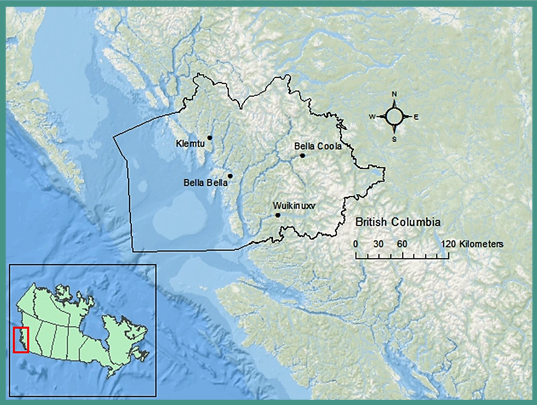Acknowledgements and Foreword (Legal Information for Indigenous People: National Edition)
Acknowledgements
The Bella Coola Legal Advocacy Program (BCLAP) provides free and confidential services in the communities of Bella Coola, Anahim Lake, Bella Bella, Klemtu and Wuikinuxv, the traditional territories of the Nuxalk, Ulkatcho, Heiltsuk, Kitasoo/Xai’xais and Wuikinuxv peoples, respectively.

Published in Bella Coola on the traditional and unceded territory of the Nuxalk Nation.
- Anne Fletcher, Editor, BCLAP Legal Advocate
- Marion Anderson, Editorial Assistant
- Kylie Schadt, Legal Researcher 2022/2023*
- Scott Leslie, Legal Researcher 2022/2023*
- Tania Wang, Legal Researcher 2022/2023*
- Frances Rosner, Supervising Lawyer 2022-2024
- Lorna Lam, Designer, Allegra Marketing Print Mail Signage, Vancouver
*law students at UBC, Allard School of Law and ProBono Students Canada volunteers
Legal Reviewers:
- Frances Rosner
- Jennifer Metcalfe
- Lisa Crossly
- Kevin Love
Many thanks to:
- Colleen Mustus and Barb Barclay of Bear Paw Media and Education for their encouragement and for sharing their publication "(Re)Claiming Indian Status" https://bearpawlegalresources.ca
- with acknowledgment also to Alberta Law Foundation for all their support of Bear Paw
- Christa Big Canoe, Legal Advocacy Director, for sharing their plain language publications about
Border and Status
- Colleen Hanasyk, University of Manitoba law student with the Prison Law Clinic, and to Marc Kruse, Indigenous Legal Studies Coordinator at UMLS, for their assistance with the Prison Rights section
- Mona O’Brian and the staff of the Mi’kmaw Legal Support Network for all their contributions
- Jennifer Metcalfe, E.D. and Staff lawyer and Lisa Crossley, Staff Lawyer @ Prisoner Legal Services (a program of West Coast Prison Justice Society) for their legal review of the Prison Law sections
- Sheila Wildeman for her help with the Prison Law section
With continued thanks to original Legal Reviewers (2022 edition):
- Tim Howard
- Kevin Love (CLAS)
- Alison Ward (CLAS)
- Chris Heslinga (ICLC)
- Chelsea Leung (ISC Estates)
- Kathy McCue (NALMA)
- Rob Dhanu
- Meghan Wallace
- Kyla Lee (Acumen Law)
- Alex Peel (Legal Aid BC)
- Joanne Taylor (NIDUS)
- and to 2022 edition PBSC UBC law students Laura Beaudry, Grace Hermansen, Lauren Ferguson, and Avery Pasternak
Funding provided by the Law Foundations of BC, Saskatchewan, Newfoundland & Labrador, Yukon, PEI, Manitoba, Nova Scotia, New Brunswick, Northwest Territories and (pending) Nunavut.
This booklet is available for download on Facebook @BCLegalAdvocates and on Clicklaw Wikibooks at wiki.clicklaw.bc.ca.
For copies contact BCLAP, Box 309, Bella Coola, BC, V0T 1C0
© 2024 BCLAP
This booklet may not be commercially reproduced but copying for non- commercial purposes, with credit, is encouraged.
This document does not contain legal advice. This document was prepared with the assistance of PBSC UBC law student volunteers. PBSC volunteers are not lawyers and they are not authorized to provide legal advice. This document contains general discussion of certain legal and related issues only. If you require legal advice, please consult with a lawyer.
Cover photo a synthesis of photos by Laurie Julian, the Indigenous Courtworker covering Antigonish and Pictou court in Nova Scotia. Her picture (Eagle feather) taken at Parish Beach at Bayfield in Antigonish county in Nova Scotia. Laurie is a Mi’kmaw woman from the Paqtnkek First Nation, Nova Scotia, and by Corrina Smiley, Caseworker for Victim Services, Communities of Care with the Mi'kmaw Legal Support Network. Her picture (Sunrise), Shore Road in Eastern Passage, Nova Scotia.
Foreword
This booklet was created by frontline advocates to help Indigenous Peoples understand how federal laws impact their lives and the special legal protections that exist within the national framework. Despite that Indigenous Peoples are subject to federal laws, understanding their rights is daunting, particularly as the legal landscape changes in response to systemic racism and discrimination. As the journey continues to have their inherent rights recognized and upheld in every legal system in Canada, there are even fewer legal supports to help Indigenous Peoples navigate the laws that govern their relationship with the federal government. The provinces offer legal aid lawyers and resources for laws administered by the province, particularly in the family and criminal law systems but there is no automatic right to a lawyer in the federal system. For Indigenous Peoples situated in remote areas, geographic barriers pose a further challenge in accessing the legal help needed to ensure their rights are understood and upheld. As an Indigenous lawyer working in the legal system, very often on behalf of Indigenous Peoples who are impacted by federal laws, I am grateful to the collective efforts of those involved in the creation of this booklet as it provides practical information and guidance on federal legal issues in easy-to-understand terms. Given the need to help Indigenous Peoples learn about their federally protected rights and the national application of federal laws, the reach in this booklet extends beyond the borders of British Columbia and will benefit Indigenous Peoples across Turtle Island, otherwise known as Canada.
- Frances Rosner, Red River Metis Lawyer
| © Copyright 2024, Bella Coola Legal Advocacy Program (BCLAP). |
| |||||||||||||||||||||||||||||||||||
